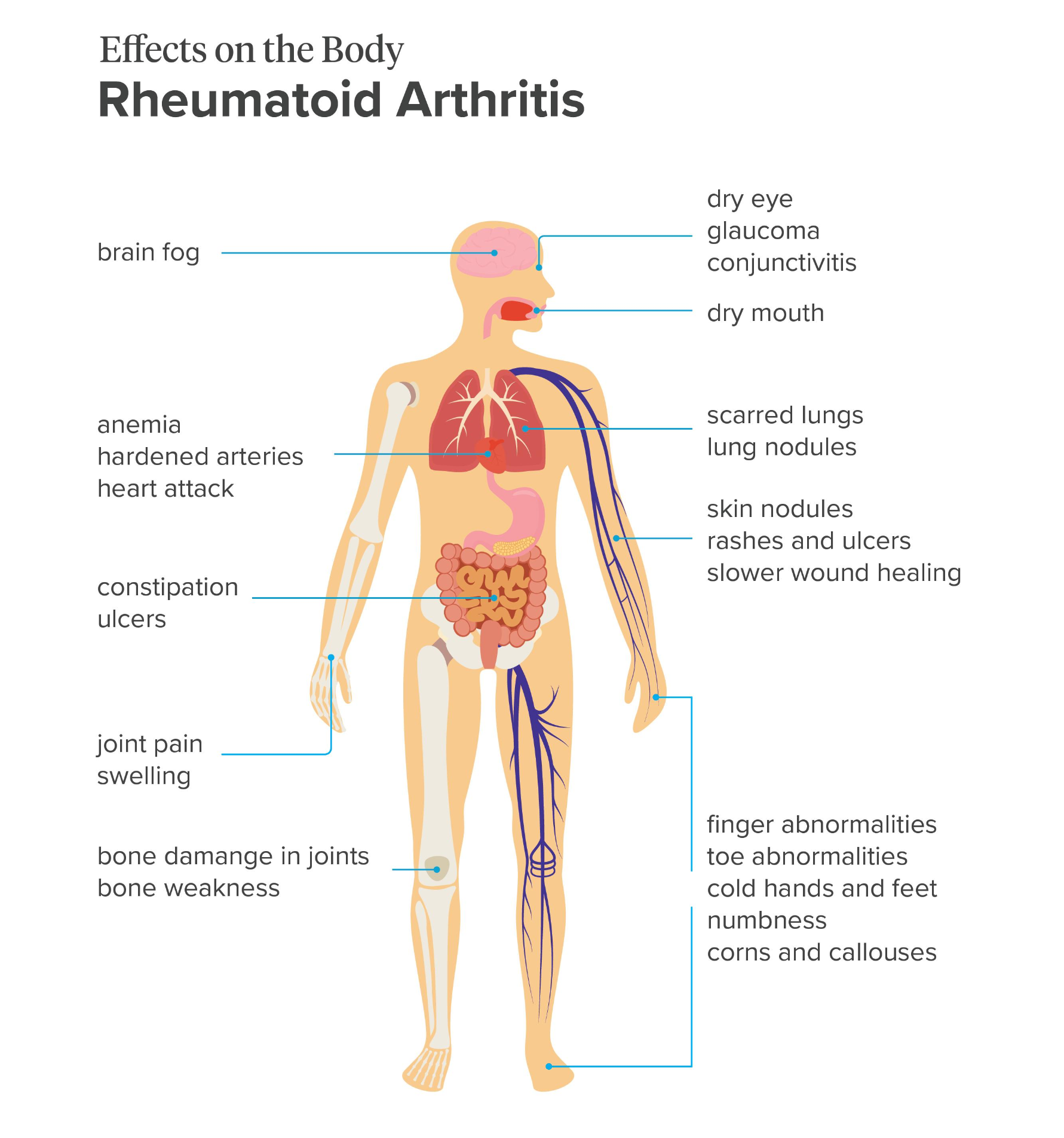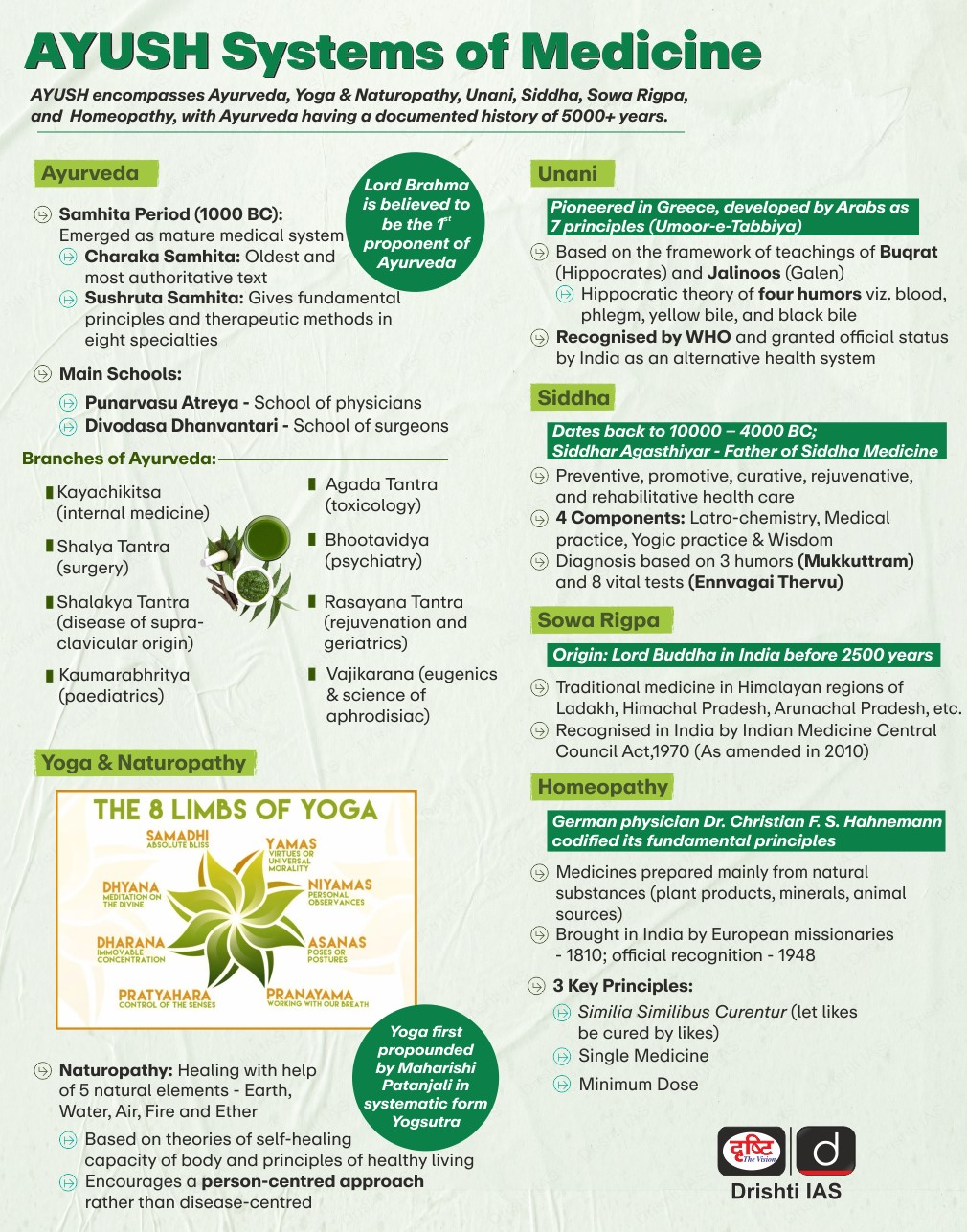Important Facts For Prelims
Use of Ayurvedic Whole System in Rheumatoid Arthritis
- 06 Sep 2024
- 6 min read
Why in News?
Recently, a study highlighted the effectiveness of the Ayurvedic Whole System (AWS) in managing Rheumatoid Arthritis (RA), a chronic autoimmune disorder.
- The research shows that the AWS not only reduces RA symptoms but also helps restore a normal metabolic balance in patients.
- It presents a promising complementary approach to conventional medical treatments.
What are Key Facts About Rheumatoid Arthritis?
- About: RA is a chronic inflammatory disorder that affects the lining of joints, causing a painful swelling that can eventually result in bone erosion and joint deformity.
- In some people, the condition can damage a wide variety of body systems, including the skin, eyes, lungs, heart and blood vessels.
- It is an autoimmune disorder. It happens when the immune system doesn’t work properly and attacks the lining of the joints, called the synovium.
- Significance of the Study: It supports the Ayurvedic concept of 'Samprapti Vighatan,' where the disease-causing process is dismantled, and the body's 'Doshas' (bio-energies) are brought back to balance.
- The research is pivotal as it explores the potential for pathology reversal in RA using an Ayurvedic whole-system approach.
- Key Clinical Improvements Observed:
- Disease Activity Reduction: There was a notable reduction in the Disease Activity Score, a critical measure for assessing RA severity.
- Decrease in Joint Inflammation: Both the total number of swollen and tender joints were reduced among patients receiving AWS treatment.
- Reduction in Toxins: The Ama Activity Measure (AAM) Score, which evaluates toxins in the body, showed significant reduction post-intervention, indicating decreased systemic inflammation and toxicity.
- Metabolic Profile Shifts: Post-AWS treatment, imbalanced metabolic markers began to shift towards normal levels observed in healthy controls, suggesting a return to a more balanced metabolic state.
- First-of-its-Kind Evidence: This study is the first to clearly demonstrate the clinical efficacy of AWS in managing RA.
- It highlights the dual benefit of symptom reduction and metabolic normalisation, potentially leading to long-term positive outcomes for patients.
What is the Ayurvedic Whole System?
- About: Ayurveda is the time tested traditional system of medicine of India.
- The term 'Ayurveda' meaning 'the knowledge of life' comprises two Sanskrit words viz 'Ayu' meaning 'Life' and 'Veda' meaning 'Knowledge' or 'Science'.
- Ayurveda is a whole-body (holistic) system of medicine. It takes a natural approach to all aspects of health and well-being.
- Ayurvedic Strategy: Ayurveda is based on the idea that each person has certain life forces (doshas) and everything in the universe is connected.
- An imbalance in one area can affect another.
- When the imbalance is not fixed, disease and illness can occur.
- Ayurveda mostly uses nutrition, lifestyle changes, and natural treatments.
- These are used to support balance and a return to health.
- Three Principal Energies (Doshas): Ayurveda identifies three basic types of energy or functional principles that are present in everyone and everything.
- Vata: It governs functions like breathing, blinking, muscle movement, and the circulation of fluids.
- Pitta: It governs digestion, absorption, nutrition, and body temperature.
- Kapha: It governs the body's structural components, lubricates joints, moisturises the skin, and maintains immunity.
UPSC Civil Services Examination Previous Year Question (PYQ)
Prelims
Q. Which one of the following pairs does not form part of the six systems of Indian Philosophy? (2014)
(a) Mimamsa and Vedanta
(b) Nyaya and Vaisheshika
(c) Lokayata and Kapalika
(d) Sankhya and Yoga
Ans: (c)
Q.With reference to the history of philosophical thought in India, consider the following statements regarding Sankhya school: (2013)
- Sankhya does not accept the theory of rebirth or transmigration of soul.
- Sankhya holds that it is the self-knowledge that leads to liberation and not any exterior influence or agent.
Which of the statements given above is/are correct?
(a) 1 only
(b) 2 only
(c) Both 1 and 2
(d) Neither 1 nor 2
Ans: (b)
Q.Consider the following statements: (2010)
- The Taxus tree is naturally found in the Himalayas.
- The Taxus tree is listed in the Red Data Book.
- A drug called “taxol” is obtained from the Taxus tree is effective against Parkinson’s disease.
Which of the statements given above is/are correct?
(a) 1 only
(b) 1 and 2 only
(c) 2 and 3 only
(d) 1, 2 and 3
Ans: (b)






